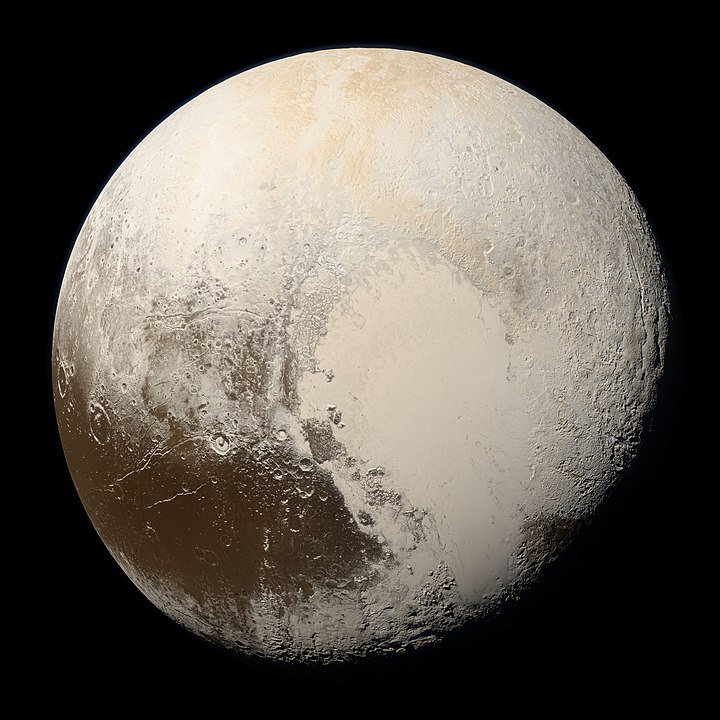I learned this today. Pluto has been classified as a dwarf planet instead of a planet because it only meets two out the of the three criteria required of a planet.
The International Astronomical Union came up with the definition of a planet in August 2006. They said that an object is a planet if:
1. It is in an orbit around the sun. (Pluto – check).
2. It is massive enough to be made round by its own gravity. (Pluto – check).
3. It must have cleared the neighborhood around its orbit. (Pluto – no check).
Pluto has number one covered because it is in an orbit around the sun. Pluto is in a huge orbit that is elliptical. It takes 248 years for Pluto to orbit the sun once and, because of the shape of its orbit, it actually goes closer to the sun than Neptune at one point.
Pluto has number two covered as well. It is obviously spherical. If planets have sufficient mass, their gravity pulls everything towards their center. That is why all planets are round, including the Earth. No matter what flat Earthers oddly seem to think. A celestial body made of rock needs to be at least 600 km in diameter in order to have enough mass to become spherical. A body made of ice only needs to be 400 km in diameter. Pluto has a diameter of 2,376.6 km, easily enough for it to be round. Its mass is about 0.02% of Earth’s and about 0.17% of the moon’s.
So, it is on rule three that Pluto falls short. Pluto has not cleared the neighborhood around its orbit. To clear the orbit means that one object is so massive that it has removed all other smaller bodies from its orbit. This would be done in three ways. Firstly, as it was forming, the larger planet would accrete all the smaller bodies through impacts. Secondly, the smaller bodies would become satellites and moons of the larger body, or a ring system. Thirdly, the larger body would force smaller bodies out of its orbit. Pluto hasn’t done any of this, which is the main reason why it has been demoted to dwarf planet status.
Pluto was discovered in 1930 by Clyde W. Tombaugh. After Neptune was discovered in 1846, astronomers had thought that there might be another big planet out beyond Neptune. It was called Planet X and the hunt became very popular. In 1929, Clyde W. Tombaugh was hired by the Lowell Observatory to look for Planet X. His job was to take pictures of the night sky two weeks apart and compare them to see if anything had moved. He used a machine called a blink comparator, which basically flicked the two images and made it easier to spot anything that had moved. It took him a year, but he found Pluto on February 18th, 1930. It was named by an eleven-year-old schoolgirl called Venetia Burney. She died in 2009, three years after Pluto was demoted.
The definition of a planet was set down on paper in 2006, at the conference where the vote was taken to demote Pluto. A lot of people think that Pluto should be reinstated as a planet. They seem to think that the astronomers had it in for Pluto. But it seems more likely that the astronomers in 1930 made a mistake. Pluto was thought to be far more massive than it actually turned out to be. And, when Eris (another dwarf planet) was discovered and proven to be ever so slightly larger than Pluto, the argument became invalid. Taken with the fact that 7 of the moons in the solar system are also larger than Pluto, it became difficult to call it a planet.
Whether you believe Pluto should be a planet or not is up to you. But there is a good argument that there is probably another planet out beyond Pluto that could be the same size as Earth. There is also a good chance that, unless we are very lucky, we will never find it. It would have an orbit that takes it so far out into space that it would only be close enough to the sun for us to see it for a short while every 12,000 years.
So, Pluto has been demoted to dwarf planet status because it is not big enough to remove all of the other bodies out of its orbit. Also, a slightly larger dwarf planet, Eris, has also been discovered, meaning that Pluto wouldn’t be the 9th largest body anyway. And that is what I learned today.
Sources
https://en.wikipedia.org/wiki/Pluto#Orbit
https://en.wikipedia.org/wiki/Planets_beyond_Neptune
https://www.loc.gov/everyday-mysteries/item/why-is-pluto-no-longer-a-planet/
https://www.space.com/18568-how-big-is-pluto.html
https://en.wikipedia.org/wiki/Clearing_the_neighbourhood
https://en.wikipedia.org/wiki/Timeline_of_discovery_of_Solar_System_planets_and_their_moons
https://www.npr.org/2011/02/04/133498152/why-the-former-planet-pluto-got-demoted
https://socratic.org/questions/how-many-moons-in-our-solar-system-are-larger-than-pluto

